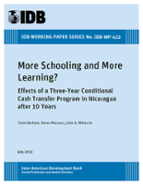More Schooling and More Learning?: Effects of a Three-Year Conditional Cash Transfer Program in Nicaragua after 10 Years
Date
Jul 2013
Conditional Cash Transfer (CCT) programs have become the anti-poverty program of choice in many developing countries. Numerous evaluations, often based on rigorous experimental designs, leave little doubt that such programs can increase enrollment and grades attained--in the short term. But evidence is notably lacking on whether these short-term gains translate into longer-term educational benefits needed to fully justify these programs. This paper uses the randomized phase-in of the RPS CCT program in Nicaragua to estimate the long-term effects on educational attainment and learning for boys, measured 10 years after the start of the program. We focus on a cohort of boys aged 9¿12 years at the start of the program in 2000 who, due to the program¿s eligibility criteria and prior school dropout patterns, were likely to have benefitted more in the group of localities that were randomly selected to receive the program first. We find that the short-term program effect of a half grade increase in schooling for boys was sustained after the end of the program and into early adulthood. In addition, results indicate significant and substantial gains in both math and language achievement scores, an approximately one-quarter standard deviation increase in learning outcomes for the now young men. Hence in Nicaragua, schooling and achievement gains coincided, implying important long term returns to CCT programs.



